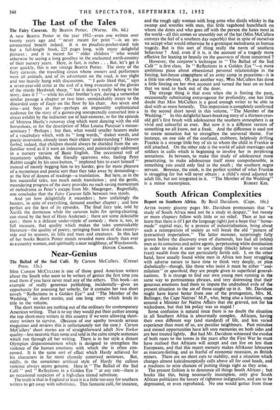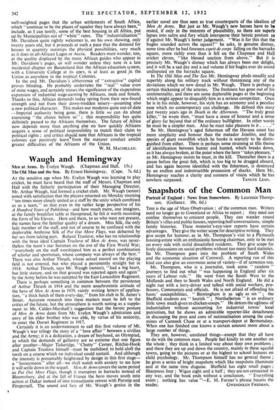South African Complexities
Report on Southern Africa. By Basil Davidson. (Cape. 16s.) AFTER twenty gloomy pages Mr. Davidson pronounces that "a study of South Africa need not be a study in despair," but twenty or more chapters follow with little or no relief. Then at last we learn that there is (if I get the language right) just a hope that "home- made" capital may, by a process of industrialisation, bring about such a reintegration of -society as will break the old "pattern of (extractive) imperialism." The latter monster, surprisingly fully grown before the discovery even of diamonds, has had all (white) men as its conscious and active agents, perpetuating white domination in order to make it easier to use cheap (black) labour to extract (vast) wealth from the not particularly fertile soil. I, on the other hand, have usually found white men in Africa too busy struggling with adverse nature to have time to think very deeply, or plan diabolically—though, like those who insist it must be either "assi- milation" or apartheid, they are people given to superficial general- isations. It is strange to find our own young men running in the same way to portmanteau phrases, and very distressing that their generous emotions lead them to impute the undoubted evils of the present situation to the sin of those caught up in it. Mr. Davidson might have learnt better from one of the protagonists, Mrs. M. Ballinger, the Cape Natives' M.P., who, being also a historian, once assured a Minister for Native Affairs that she grieved, not for his wickedness, but that his policy was so stupid !
Some confusion is natural since there is no doubt the situation in all Southern Africa is abnormally complex. Africans, having their own different way (and standard) of life, and less varied experience than most of us, are peculiar neighbours. Past mistakes and missed opportunities have left sore memories on both sides and are best treated lightly. But had Mr. Davidson witnessed the exodus of both races to the towns in the years after the First War he must have realised that Africans will accept and can live on less than Europeans, and that this recent memory makes Afrikaner labourers as insecure-feeling, and as fearful of economic recession, as British miners. There are no short cuts to stability, and a situation which changes almost kaleidoscopically calls above all for cool heads, and a readiness to seize chances of putting things right as they arise.
The present fashion is to denounce all things South African ; but books like this, being necessarily incomplete, only give South African politicians the luxury of righteous indignation, and are to be deprecated, or even reprobated. No one would gather from these well-weighted pages that the urban settlements of South Africa, which "continue to be the places of squalor they have always been," include, as I can testify, some of the best housing in all Africa, put up by Municipalities out of "white" rates. The "industrialisation" Mr. Davidson quite rightly welcomes-is, on his own showing, only twenty years old, but it proceeds at such a pace that the demand for houses in quantity outstrips the physical possibilities, very much as it does in all-African Lagos or Accra. Readers must wonder, too, at the quality displayed by the many African guides who appear in Mr. Davidson's pages, or will wonder unless they note in a late incidental chapter on Basutoland that the African education system, with a University College at its apex, is at least as good in the Union as anywhere in the tropical Colonies. In the end Mr. Davidson's abhorrence of "extractive" capital proves blinding. He probably underrates the "real" value even of mine wages, and certainly misses the significance of the stupendous expansion of industrial wage-earning by Africans, male and female. Thanks to this, African demands today spring from their new-found strength- and not from their down-trodden misery—assuming also a new political character. This makes our moderns quite out-of-date —Imperial authority being gone, there is little we can do about exercising " the choice before us" ; this responsibility has quite definitely passed to the Africans themselves. The future of Africa now depends more than anything else on how quickly Africans acquire a sense of political responsibility to match their claim to political rights ; and critics should note that Africans in the tropical colonies can positively learn' from the maturer conduct amidst greater difficulties of the Africans of the Union.
W. M. MACMILLAN.



































 Previous page
Previous page